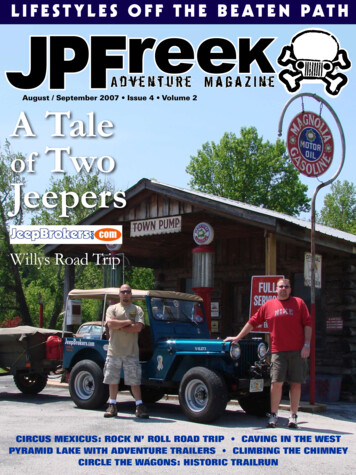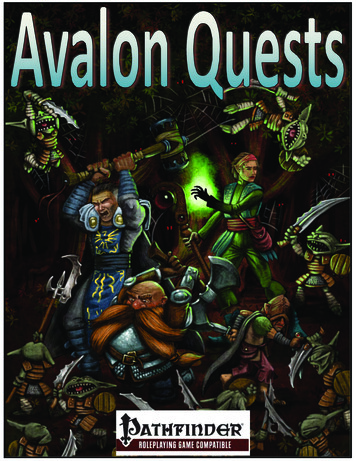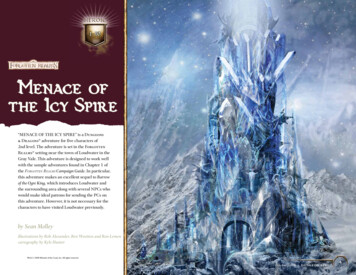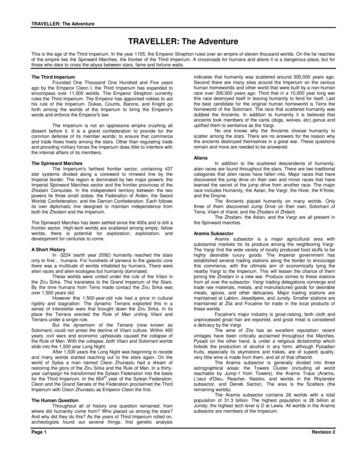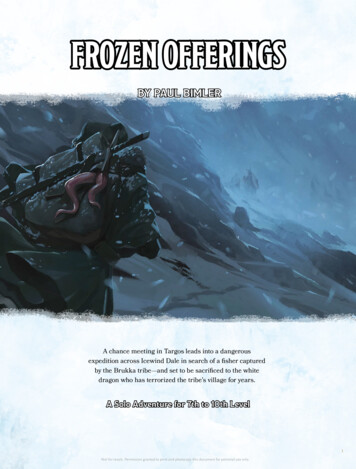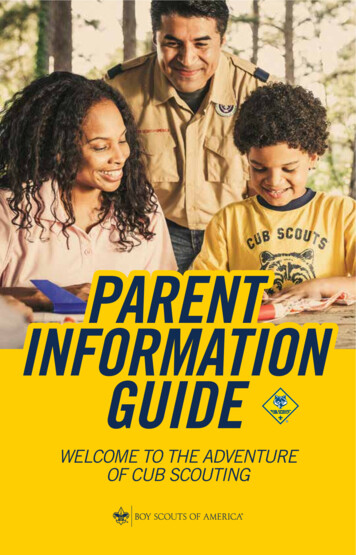
Transcription
WELCOME TO THE ADVENTUREOF CUB SCOUTING
Why Join Cub Scouting? Your time is valuable. More than ever, today’s families strive to findquality time to spend together. Cub Scouting helps to support yourfamily by providing ready-made opportunities for you and your son todo things together. Cub Scout-age boys benefit developmentally from belonging to a group ofboys their own age. Through this sense of belonging, boys build self-esteemand learn to get along with others. As a parent, you want to be assured that the groups that your boy joins willteach values consistent with good citizenship, character development, andphysical fitness. The Boy Scouts of America has been weaving these lifetimevalues into fun and educational activities since 1910. In a society where your son is taught that winning is everything, Cub Scoutingteaches him to “do his best” and to be helpful to others. Scouting teaches family values and works to strengthen your relationship withyour son. Scouting activities can bring added value to the time you alreadyhave with your son. He will learn to live by the code of “On my honor.”But we know that boys do not join Cub Scouting just to get their character built.Boys join because it is fun. And fun is at the heart of everything Cub Scouts do—from exploring natural habitats to building model cars and robots to trying sportslike archery or telling stories around a campfire. Boys in Cub Scouting might belearning great lessons, but they’re far too busy having fun to notice.2
How Does Cub Scouting Work?One unique thing about Cub Scouting is that you, as his family, join in on theprogram with your son, and you will help him along the way. Cub Scouting existsto support your family and help enrich your family time together. Boys have adifferent handbook at each grade level, with adventures that are age-appropriate fortheir developmental level. As your boy advances through these books by workingon adventures with you, he will earn badges and other recognition that he can wearon his uniform. Your son’s success in Cub Scouting depends on you!The Cub Scouting program takes place at two levels. Your son will be a part of a den,a small group of boys in the same grade level who usually meet weekly. All dens, fromgrades 1 through 5, make up a pack. Once a month, the dens, withtheir families, are together at the pack meeting, where boys show offthe new skills they have learned during the month and are recognizedfor the badges they have earned. All boys, when they join, earn theBobcat badge first. Your den leader will show you how.DensThe Tiger Den (Grade 1)Parents are most involved at the Tiger level. The boy and hisparent or guardian join the den together and attend all meetingsTIGERand activities together.The den is made up of three to eight of these parent-son teams. Each denalso has a Tiger den leader (usually one of the parents) who helps coordinate themeetings. The parent-son teams take turns running the activities and planningmeetings with the Tiger den leader. The den usually meets weekly either atthe homes of host parent-son teams or at a designated facility; participates inadventures, some of which involve outings; and attends the monthly pack meeting.3
The Wolf (Grade 2) and Bear (Grade 3) DensParents are vital to the Cub Scout dens, both in the role of homesupport and to help the den leader. Boys at this are beginning to bemore independent, and not every boy needs a parent at every meeting.The den consists of four to eight boys, a den leader and assistant denleader (usually parents of some of the boys), and often a den chief(an older Boy Scout or Venturer who helps the den leader).They usually meet once a week at a regularly scheduled time andplace, and they also attend the pack meeting with their families.The Webelos Scout Den (Grades 4 and 5)The Webelos den is much like the Wolf and Bear dens, butthere is more emphasis on the boys learning to take leadershiproles and preparing to become Boy Scouts.Pack MeetingsThe Cub Scout pack is made up of all the dens, whichmeet monthly at the pack meeting, led by the Cubmaster. This is the climax ofthe weekly den meetings and activities. There are games, skits, songs, ceremonies,and presentations of badges that boys earned during that month. This is wherefamilies—not just parents, but siblings, too—can see the achievements of theirCub Scout.The pack, including families, also participates in other special events throughoutthe year, including:Pinewood derby —You can build and race a model car with your son.Blue and gold banquet—Cub Scouting’s birthday party—for all pack membersand their families— takes place in February.Camping—Overnight and day camp opportunities introduce your family to thecamping experience.4
Service projects—Packs may participate in food drives, conservation projects, orother community activities.Field trips and special outings—Den outings are a great way to learn more aboutthe people and places in your community.Make memories with your son that will last a lifetime!How Can You Help?The most important help that you, as a parent, can give your boy is to work withhim on his Cub Scouting adventures and help him achieve his badge of rank. Hishandbook is full of age-appropriate activities that you will enjoy doing togetherat home. When he completes a project, it is your responsibility to sign his bookto verify that he has done his best. This will help the den leader know that heor she can sign off on that part of your son’s rank requirements and arrange forrecognition for his efforts. And then it is all-important for you to attend themonthly pack meeting with him, so you can celebrate his achievement. Your roleas a parent is the secret to a successful Cub Scouting program!The den and the pack also rely on parent participation to run a successful program.Cub Scouting operates through volunteer leadership. Consider volunteeringas a member of the pack leadership team. Volunteer leaders are an example ofScouting’s principle of service to others. By volunteering in Scouting, you are alsogiving your son the gift of your time. What could be more valuable? You will havean opportunity to be a positive influence in his life and in the lives of his friends.Here are some of the ways you could volunteer:Den leader. Leads the den at weekly den and monthly pack meetings. Attends themonthly pack committee meeting.Cubmaster. Helps plan and carry out the pack program with the help of the packcommittee. Emcees the monthly pack meeting and attends the pack committee meeting.5
The Pack CommitteeEvery Cub Scout parent or guardian is invited to become a member of the pack committee.Pack committee members perform administrative functions of the pack. The committeemeets monthly and includes the responsibilities below.Committee chairman. Presides at all pack committee meetings. Helps recruit adultleaders and attends the monthly pack meeting and pack committee meeting.Advancement chairman. Maintains advancement records for the pack. Ordersand obtains all badges and insignia. Attends the monthly pack meeting and packcommittee meeting.Membership chairman. Manages the transition of new Scouts into the pack andcoordinates orientation for new Scouting families. Responsible for the marketing andrecruiting initiatives of the pack, as well as the growth and retention of the unit.Secretary/treasurer. Keeps all records for the pack, including pack bank account,financial records, etc. Attends the monthly pack meeting and pack committee meeting.Pack trainer. Coordinates training for adults. Promotes leader training and roundtablemeeting attendance. Attends the monthly pack meeting and pack committee meeting.TrainingThe Boy Scouts of America offers convenient training for parents who volunteer to serve asleaders. As a new parent, you can learn all about Cub Scouting and how quality Scoutingprograms are built at the pack level. Log on to My.Scouting.org and create an account togain access to all available training content. For more information about training at all levelsof the program, go to www.scouting.org/training.We encourage all parents to take the BSA’s Youth Protection training, which isrequired for all adult leaders.To find out more about the Youth Protection policies of the Boy Scouts of Americaand how to help Scouting keep your family safe, see the Parent’s Guide in any of theCub Scouting or Boy Scouting handbooks, or go to www.scouting.org/Training/YouthProtection.aspx. Completion of the “Exercises in Personal Safety Awareness”in the Parent Guide with your son is a requirement for rank advancement.Youth ProtectionChild abuse is a serious problem in our society, and unfortunately, it can occur anywhere,even in Scouting. Youth safety is of paramount importance to Scouting. For that reason, theBSA continues to create barriers to abuse beyond what have previously existed in Scouting.The Boy Scouts of America places the greatest importance on providing the most secureenvironment possible for its youth members. To maintain such an environment, theBSA has developed numerous procedural and leadership selection policies, and provides6
parents and leaders with numerous online and print resources for the Cub Scout,Boy Scout, and Venturing programs.Youth Protection training is required for all BSA registered volunteers. Parents arestrongly encouraged to take Youth Protection training to become familiar withpolicies, procedures, and guidelines.New leaders are required to complete Youth Protection training within 30 days ofregistering. To take the training online, go to My.Scouting.org and establish an accountusing the member number you receive when you register for BSA membership. Ifyou take the training online before you obtain a member number, be sure to returnto MyScouting and enter your number for training record credit. Your BSA localcouncil also provides training on a regular basis if you cannot take it online. For moreinformation, refer to the back of the BSA adult membership application, No. 524-501.Youth Protection training must be taken every two years. If a volunteer’s Youth Protectiontraining record is not current at the time of recharter, the volunteer will not be registered.For more information about Youth Protection, please see BSA’s Youth Protection websiteat www.scouting.org/youthprotection.aspx.Volunteer Incident Report Form: www.scouting.org/filestore/pdf/680-676 WEB.pdfHow Much Does Scouting Cost?Registration fee—annual fee for youth and leaders(The leader’s fee includes a subscription to Scouting magazine.): . 24Boys’ Life magazine—optional, but strongly recommended: . 12Books—Youth handbooks are the Tiger Handbook, Wolf Handbook, BearHandbook, and Webelos Handbook. Adult leaders use one or more of the followingresources: the Cub Scout Leader Book, Tiger Den Leader Guide, Wolf Den LeaderGuide, Bear Den Leader Guide, and Webelos Den Leader Guide. See your localScout shop or www.scoutstuff.org for prices and a wealth of other reasonablypriced resources.Pack dues—The amount varies by pack, depending on money-earning projectsconducted by the pack to decrease the amount needed to run the pack program.Uniform—The uniform and its cost vary by program for both youth and adult.Uniforms may also be purchased at your local Scout shop. See www.scoutstuff.orgfor details and current prices.7
You Are Not Alone!Your den is in a pack that belongs to an organization chartered by the Boy Scoutsof America (BSA) to operate a Scouting unit (a chartered organization). Thechartered organization approves leadership, helps secure a meeting place, and makessure that the pack works within the guidelines and policies of their organization aswell as those of the BSA.Many volunteers and BSA professionals are interested in the success of your pack.A special volunteer assigned to help your pack is called a commissioner. Thecommissioner helps the pack provide a successful and high-quality program. Thecommissioner is also the communication link between your pack and the local council.All leaders need training to be effective. The BSA provides both online andinstructor-led training for adult volunteers in how to be a successful leader.Your district is one of several in the BSA local council. The professional staff atyour council service center can help or will get you in touch with someone who can.Local Council Locator: www.scouting.org/LocalCouncilLocator.aspxMy son is in Pack , which meets at (location)at (time) on (day and week of month).He is in Den , which meets at (location)at (time) on (day of week).Our pack’s chartered organization is .Our local council name is .Phone No. WebsiteOur LeadersNameDen leaderCommittee ChairCubmasterBOY SCOUTS OF AMERICA1325 West Walnut Hill LaneP.O. Box 152079Irving, Texas 75015-2079www.scouting.orgPhone No. 2016 Boy Scouts of AmericaEmail512-7352016 Printing
quality time to spend together. Cub Scouting helps to support your family by providing ready-made opportunities for you and your son to do things together. Cub Scout-age boys benefit developmentally from belonging to a group of boys their own age. Through this sense of belonging, boys build self-esteem and learn to get along with others.



